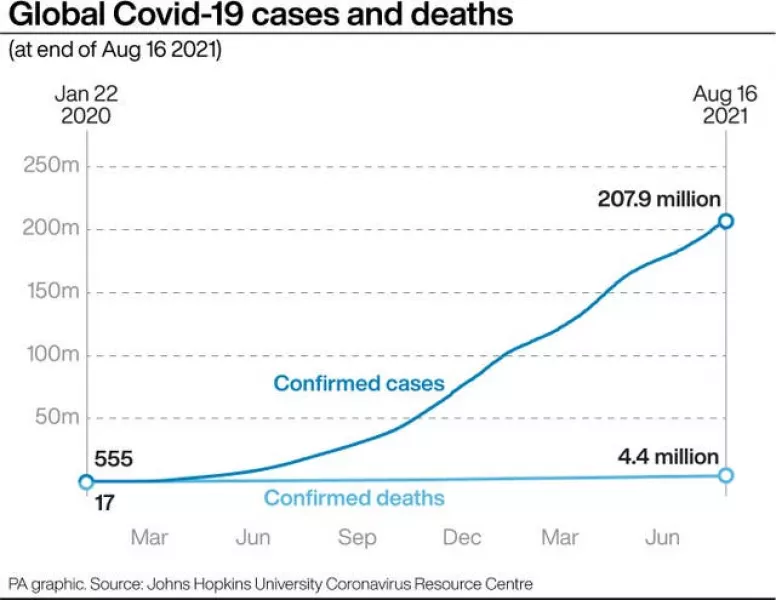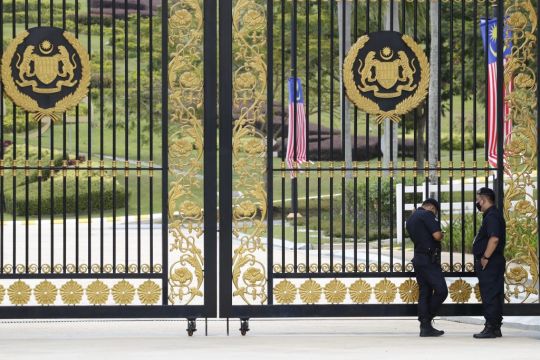Malaysia’s king summoned the heads of political parties as he swiftly began the task of selecting a new prime minister amid a worsening coronavirus outbreak.
The resignation of prime minister Muhyiddin Yassin on Monday after less than 18 months in office followed mounting public anger over what was widely perceived as his government’s poor handling of the pandemic.
Malaysia has one of the world’s highest infection rates and deaths per capita, with daily cases breaching 20,000 this month despite a seven-month state of emergency and a lockdown since June.
The monarch has ruled out a general election because many parts of the country are Covid-19 red zones and health facilities are inadequate.

Mr Muhyiddin was appointed caretaker prime minister until a successor is found.
Leaders from at least six parties were seen entering the palace.
They included opposition leader Anwar Ibrahim and the heads of two other parties in his alliance, as well as the president of former prime minister Mahathir Mohamad’s small opposition party.
The chiefs of the United Malays National Organization (UMNO) and an Islamic party which were part of Mr Muhyiddin’s alliance were also summoned.
The king plays a largely ceremonial role but appoints the person he believes has majority support of Parliament to be prime minister.
Mr Muhyiddin took power in March 2020 after initiating the collapse of the reformist government that won 2018 elections.
With a razor-thin majority in Parliament and an unstable coalition, he became the country’s shortest-ruling leader.
The king, Sultan Abdullah Sultan Ahmad Shah, also asked all politicians to individually submit the name of a preferred candidate for prime minister.
This is somewhat similar to how the king picked Mr Muhyiddin last year.
The monarch interviewed all 222 politicians individually, then sought nominations from party leaders in an arduous process.
His choice of Mr Muhyiddin was disputed by the person he ousted, Mahathir Mohamad, and by the opposition.

The selection this time will be another tough chore for the monarch because no coalition hold a majority.
Mr Anwar’s three-party alliance, the biggest opposition bloc, has nominated Mr Anwar but has less than 90 parliamentarians, short of the 111 needed for a simple majority.
That is also less than the 100 lawmakers believed to have backed Mr Muhyiddin.
Mr Anwar received a boost Tuesday when a party from eastern Sabah state with eight politicians said it would throw its support behind him if he is able to secure enough numbers.
Other contenders include former deputy prime minister Ismail Sabri from UMNO, the biggest party in Mr Muhyiddin’s alliance with 38 politicians.
But he may not get his party’s backing because he earlier led a faction backing Mr Muhyiddin against the party’s decision to pull its support.
Local media said another possible candidate is Razaleigh Hamzah, an 84-year-old prince who was a former finance minister.
Mr Razaleigh, also a UMNO politician, is seen as a neutral candidate who could unite the party’s warring factions.

Meanwhile, Mr Mahathir, 96, has called for a national recovery council to be formed and led mainly by professionals to resolve the country’s economic and health crises.
The Bersih electoral reform group urged contenders to pursue political stability by offering multiparty governance and institutional reforms, and not just conduct horse-trading over numbers and positions.
“The endless political machination due to winner-takes-all politics in a de facto hung parliament for the past one and a half years must now end to enable a more effective governance of health and economy.
“The new prime minister must quickly convene a special meeting and table a motion of confidence in himself to prove his majority,” it said in a statement.
It warned that a short-sighted and self-serving government would be punished by voters in the next election.







